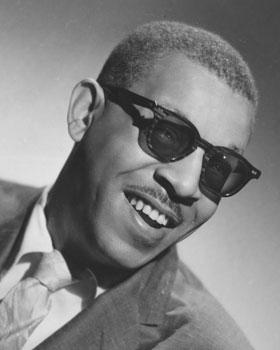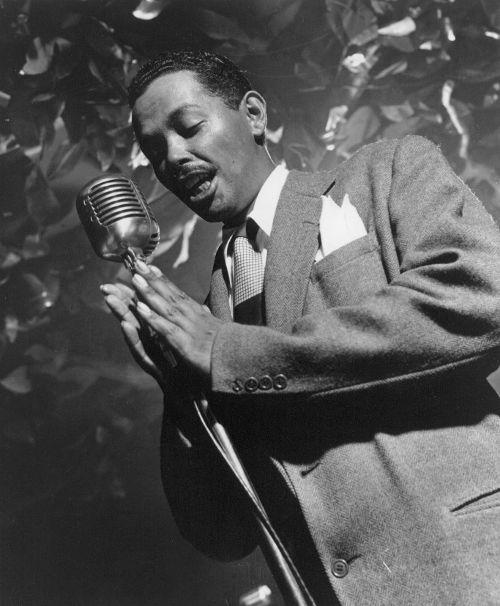Al Hibbler (Albert George Hibbler)

Al Hibbler was born in Tyro, Mississippi, United States, and was blind from birth. Some sources give his birth name as Andrew George Hibbler.[3] At the age of 12 he moved to Little Rock, Arkansas, where he attended Arkansas School for the Blind, joining the school choir. Later he began working as a blues singer in local bands, failing his first audition for Duke Ellington in 1935. However, after winning an amateur talent contest in Memphis, Tennessee, he was given his start with Dub Jenkins and his Playmates; Jenkins was a popular Memphis saxophonist and bandleader. He later joined a band led by Jay McShann in 1942, and the following year joined Ellington’s orchestra, replacing Herb Jeffries. Al Hibbler stayed with Ellington for almost eight years, and featured on a range of Ellington standards, including “Do Nothin’ Til You Hear From Me”, the words for which were written specifically for him and which reached # 6 on the Billboard pop chart (and # 1 for eight weeks on the “Harlem Hit Parade”) in 1944, “I Ain’t Got Nothin’ But the Blues,” and “I’m Just a Lucky So-and-So”. Although Hibbler’s style was described as “mannered”, “over-stated”, and “full of idiosyncrasies” and “bizarre vocal pyrotechnics”, he was also considered “undoubtedly the best” of Ellington’s male vocalists. While with Ellington, Hibbler won the Esquire New Star Award in 1947 and the Down Beat award for Best Band Vocalist in 1949.
Al Hibbler left Ellington’s band in 1951 after a dispute over his wages. He then recorded with various bands including those of Johnny Hodges and Count Basie, and for various labels including Mercury and Norgran, a subsidiary of Verve Records, for whom he released an LP, Al Hibbler Favorites, in 1953. In 1954 he released a more successful album, Al Hibbler Sings Duke Ellington, and in 1955, he started recording with Decca Records, with immediate success. His biggest hit was “Unchained Melody”, which reached # 3 on the US pop chart, sold over one million copies, and was awarded a gold disc. Its success led to network appearances, including a live jazz club remote on NBC’s Monitor. Other hits were “He” (1955), “11th Hour Melody” and “Never Turn Back” (both in 1956). “After the Lights Go Down Low” (also in 1956) was his last top ten hit. He died at Holy Cross Hospital in Chicago in 2001, at the age of 85. He is buried at Lincoln Cemetery in Blue Island, Illinois.
Born
- August, 16, 1915
- USA
- Tyro, Mississippi
Died
- April, 24, 2001
- USA
- Chicago, Illinois
Cemetery
- Lincoln Cemetery
- Blue Island, Illinois
- USA



